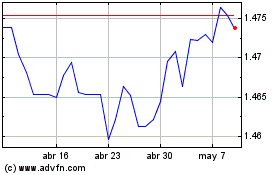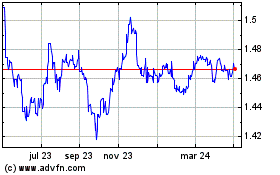Euro Drops On Weak Eurozone PMI, German Factory Orders Data
06 Mayo 2020 - 1:33AM
RTTF2
The euro depreciated against its major counterparts in the
European session on Wednesday, as the euro area private sector
activity shrank in April and German factory orders plunged in
March, led by the severe disruption caused by the coronavirus
pandemic.
Final survey results from IHS Markit showed that the composite
output index slid to a new series low of 13.6 from March's 29.7.
The flash score was 13.5.
The services Purchasing Managers' Index sank to 12.0 from 26.4
in the previous month.
Germany's composite output index posted a historic low of 17.4,
down from the previous record of 35.0 in March and the flash
reading of 17.1.
The services PMI came in at an all-time low 16.2 versus 31.7 in
the previous month. The initial reading was 15.9.
Data from Destatis showed that German factory orders declined
the most since the records began in 1991, due to the coronavirus
pandemic.
Factory orders declined sharply by 15.6 percent on a monthly
basis in March, much bigger than the 1.2 percent drop logged in
February.
This was the biggest fall since January 1991. Economists had
expected a 10 percent decrease.
The euro fell to near a 2-week low of 1.0791 against the
greenback, 3-1/2-year low of 114.72 against the yen and a 6-day low
of 1.5168 against the loonie, pulling away from its early highs of
1.0848, 115.60 and 1.5253, respectively. The next likely support
for the euro is seen around 1.05 against the greenback, 111.00
against the yen and 1.48 against the loonie.
The euro depreciated to 6-day lows of 1.6778 against the aussie
and 1.7827 against the kiwi, and held steady thereafter. The euro
had ended Tuesday's trading session at 1.6843 against the aussie
and 1.7900 against the kiwi.
The euro edged down to 1.0524 against the franc, from a high of
1.0550 hit at 5:00 pm ET. On the downside, 1.02 is possibly seen as
the next support level for the euro.
In contrast, the euro rallied to 0.8734 against the pound. If
the euro rises further, 0.90 is possibly seen as its next
resistance level.
Survey data from IHS Markit showed that the UK construction
sector contracted at the sharpest pace since the survey began in
1997 amid site closures due to the coronavirus, or covid-19,
pandemic.
The IHS Markit/Chartered Institute of Procurement & Supply
construction Purchasing Managers' Index fell to 8.2 in April from
39.3 in March. A score below 50 indicates contraction. The expected
score was 22.0.
Looking ahead, U.S. ADP private payrolls data for April is due
out at 8:15 am ET.
Euro vs CAD (FX:EURCAD)
Gráfica de Divisa
De Mar 2024 a Abr 2024

Euro vs CAD (FX:EURCAD)
Gráfica de Divisa
De Abr 2023 a Abr 2024
